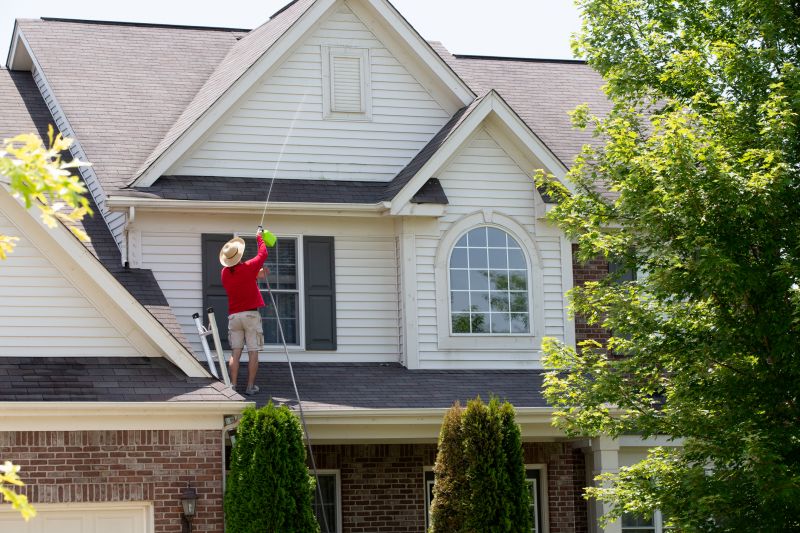Top-Rated Products For Siding Service Projects
Browse a curated list of high-performance tools and materials tailored for siding contractors and DIY enthusiasts.
 In Mason, Ohio, maintaining the integrity and appearance of building exteriors often involves the use of various siding products. Selecting the right materials and tools is essential for achieving durable, visually appealing results in siding installation, repair, or replacement projects. Whether working on residential or commercial properties, understanding the different product options available can help ensure a successful siding service. From traditional materials like vinyl and wood to modern options such as fiber cement and composite panels, there is a wide array of products suited for diverse needs and preferences.
In Mason, Ohio, maintaining the integrity and appearance of building exteriors often involves the use of various siding products. Selecting the right materials and tools is essential for achieving durable, visually appealing results in siding installation, repair, or replacement projects. Whether working on residential or commercial properties, understanding the different product options available can help ensure a successful siding service. From traditional materials like vinyl and wood to modern options such as fiber cement and composite panels, there is a wide array of products suited for diverse needs and preferences.
Top Overall Option
Versatile Siding Panel System
A versatile siding panel system offers a flexible solution suitable for a variety of building styles and applications. These panels are designed for easy installation, durability, and aesthetic appeal, making them a popular choice for both professional contractors and DIY homeowners. They often come with features such as weather resistance, low maintenance requirements, and compatibility with different finishing options. Selecting a high-quality panel system can help ensure a long-lasting exterior that withstands regional weather conditions while providing an attractive appearance.
Types of Products For Siding Service
Vinyl Siding
A popular and affordable option known for its low maintenance and wide range of colors and styles.
Wood Siding
Provides a natural and traditional look, with options for paint or stain to customize appearance.
Fiber Cement Siding
A durable material that mimics the look of wood or masonry while offering resistance to pests and weather.
Aluminum Siding
Lightweight and resistant to rust, suitable for various architectural styles.
Composite Siding
Made from a blend of materials for enhanced durability and versatility in design.
Stone Veneer Siding
Creates a natural stone appearance with easier installation and lower weight.
Brick Veneer Siding
Offers the aesthetic of traditional brick with simplified installation processes.
Metal Siding Panels
Provides a modern look with high durability and minimal maintenance requirements.
Insulated Siding
Features a foam core for added energy efficiency and insulation benefits.
Panel Cladding Systems
Prefabricated panels designed for quick installation and uniform appearance.
PVC Siding
A plastic-based option offering resistance to moisture and pests.
Stucco Siding
A textured finish suitable for various architectural styles, often applied over lath or mesh.
Engineered Wood Siding
Manufactured for enhanced resistance to moisture and pests, mimicking real wood.
Rubber Siding
Flexible and impact-resistant, suitable for certain commercial applications.
Cedar Shake Siding
Provides a rustic, textured appearance with natural wood benefits.
Popular Choices
Widely used for its affordability and variety of styles, making it a common choice.
Known for its durability and low maintenance, frequently selected for exterior cladding.
Favored for its natural look and customizable finishes, popular among homeowners.
Chosen for its modern appearance and resilience in various climates.
Popular for energy efficiency and added insulation properties.
Often used to enhance curb appeal with a natural stone appearance.
Selected for traditional aesthetic appeal and ease of installation.
Gaining popularity for its durability and design flexibility.
Recognized for moisture resistance and minimal upkeep.
Chosen for its textured look and versatility across architectural styles.
Popular for its combination of natural appearance and enhanced resistance.
Selected for a rustic, textured exterior with natural wood benefits.
Proper siding application requires not only quality materials but also appropriate accessories and tools. This includes primers, sealants, fasteners, and specialized installation equipment that facilitate efficient and effective work. Additionally, considering factors such as climate resistance, ease of maintenance, and compatibility with existing structures can influence the choice of products. For professionals and DIY enthusiasts alike, having access to a comprehensive selection of siding products and related supplies can streamline projects and enhance the longevity of the installed siding.
In Mason, OH, local suppliers and hardware stores provide a variety of siding products tailored for different applications. It is important to select products that meet local building codes and withstand the regional weather conditions. Investing in high-quality materials and reliable tools can contribute to the overall success of siding projects, ensuring they stand the test of time and weather. Whether updating a single facade or undertaking a large-scale installation, understanding the options available helps in making informed decisions that align with project goals and budget considerations.
Key Buying Considerations
- Climate resistance and weather durability of the siding material.
- Compatibility with existing building structure and aesthetic goals.
- Maintenance requirements and ease of cleaning over time.
- Installation complexity and whether professional help is needed.
- Energy efficiency benefits, such as insulation properties.
- Material weight and handling during installation.
- Availability of color options and finishing styles.
- Resistance to pests, mold, and rot.
- Cost and overall budget constraints.
- Local building code compliance and regulations.
- Warranty and manufacturer support for the product.
- Environmental resistance, including UV protection and moisture barriers.
- Compatibility with accessories like trim, fasteners, and sealants.
- Long-term durability and expected lifespan of the siding.
- Aesthetic preferences and architectural style compatibility.
